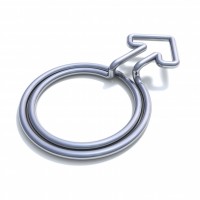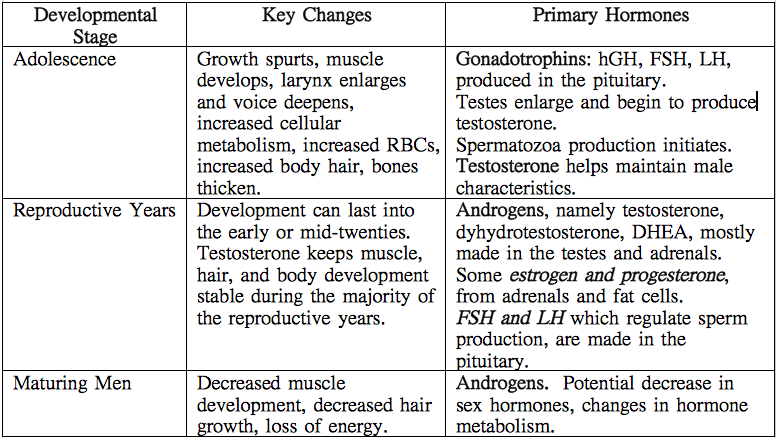
In honor of Father’s Day on June 16, we are celebrating Men’s Health Week June 11-17. What is more fitting than discussing a man’s reproductive health, as that is what leads to fatherhood!
As men age, there are patterns of change in hormonal health. Here is a chart that captures some of the primary stages of male development. Below the chart, you will find some key health concerns that you should ask your doctor about and some natural tips to support optimal hormone health.
Possible Concerns
- Concerns for Adolescents: acne, anxiety/depression, testicular torsion or other trauma, varicocele, epididymitis, hydrocele, inguinal hernia.
- Concerns for Reproductive Years: infertility, testicular cancer (especially men under age 40), sexually transmitted diseases, prostatitis, urinary tract infections.
- Concerns for Maturing Men: erectile dysfunction, decreased libido, andropause (decreased male sex hormones), prostate disease (cancer or hypertrophy), bladder function, muscle loss, hair loss, or memory decline.
*As always, speak with your doctor if you believe that you should have your hormones tested or a specific condition evaluated.
Supportive measures
- Support for adolescent development: make sure that adolescents are getting enough exercise, micro-nutrients such as B-vitamins, beta-carotene, zinc, and selenium, and essential fatty acids (omega-3s and GLA) to help with hormone production and skin health. Many teenage boys benefit from a gentle liver tonic to help the liver process the surges of hormones.
- Support for reproductive health and good pre-conception care: daily multivitamin, essential fatty acids and antioxidants like vitamin E or CoQ10. Talk to your doctor about getting off certain medications that may decrease sperm count like Tagamet (cimetidine), sulfasalazine, nitrofurantoin, and various steroids. Also, avoid exposures at work or at home to chemical fertilizers, pesticides, lead, nickel, mercury, chromium, ethylene glycol, petrochemicals, benzene, perchloroethylene. Avoid alcohol, tobacco, marijuana or any illicit drugs. Keep your testicles cool by avoiding hot tubs, saunas, electric blankets and consider taking a break from over-doing the cycling which can heat up and create mild trauma to the testes. Keep your diet and weight in healthy ranges and avoid foods that may contain hormones or petrochemicals.
- Nutrients for the mature man: Micronutrients in a multivitamin including B-vitamins and minerals that emphasize selenium and zinc. Herbs and food that support the prostate include saw palmetto and pumpkin seeds. Keep your weight in a healthy range and optimize activity levels, including weight training to maintain muscle mass.
- Supplements for libido and erectile dysfunction: Maca, Tribulus, and Nitric Oxide boosters. Please speak with a Peoples Staff Member if you are interested in learning more about these products and how they work. Also make sure to use a gentle, natural moisturizer like almond oil for the skin of the penis to maintain optimal sensitivity.
*Speak with a healthcare professional before beginning any new regimen or supplement.*
by Julia Strickler, ND*
*Naturopathic doctors are not yet licensed in the state of Texas.

